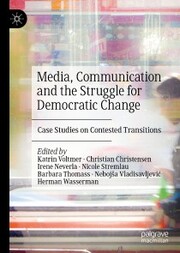Detailansicht
Media, Communication and the Struggle for Democratic Change
eBook - Case Studies on Contested Transitions
ISBN/EAN: 9783030167486
Umbreit-Nr.: 7926854
Sprache:
Englisch
Umfang: 0 S., 3.61 MB
Format in cm:
Einband:
Keine Angabe
Erschienen am 28.08.2019
Auflage: 1/2019
E-Book
Format: PDF
DRM: Digitales Wasserzeichen
- Zusatztext
- <p>This book investigates the role of media and communication in processes of democratization in different political and cultural contexts. Struggles for democratic change are periods of intense contest over the transformation of citizenship and the reconfiguration of political power. These democratization conflicts are played out within an increasingly complex media ecology where traditional modes of communication merge with new digital networks, thus bringing about multiple platforms for journalists and political actors to promote and contest competing definitions of reality. The volume draws on extensive case study research in South Africa, Kenya, Egypt and Serbia to highlight the ambivalent role of the media as force for democratic change, citizen empowerment, and accountability, as well as driver of polarization, radicalization and manipulation.</p>
- Kurztext
- This book investigates the role of media and communication in processes of democratization in different political and cultural contexts. Struggles for democratic change are periods of intense contest over the transformation of citizenship and the reconfiguration of political power. These democratization conflicts are played out within an increasingly complex media ecology where traditional modes of communication merge with new digital networks, thus bringing about multiple platforms for journalists and political actors to promote and contest competing definitions of reality. The volume draws on extensive case study research in South Africa, Kenya, Egypt and Serbia to highlight the ambivalent role of the media as force for democratic change, citizen empowerment, and accountability, as well as driver of polarization, radicalization and manipulation.
- Autorenportrait
- <b>Katrin Voltmer</b> is Professor of Communication and Democracy at the University of Leeds, UK. <div><br></div><div><b>Christian Christensen</b> is Professor of Journalism at Stockholm University, Sweden.</div><div><br></div><div><b>Nicole Stremlau</b>is Research Professor in the Humanities at the University of Johannesburg, South Africa and Head of the Programme in Comparative Media Law and Policy, Centre for Socio-Legal Studies, at the University of Oxford, UK.</div><div><br></div><div><b>Irene Neverla</b>is Professor Emerita at the Institute of Journalism and Mass Communication, University of Hamburg, Germany.</div><div><br></div><div><b>Barbara Thomass</b>is Professor for International Comparison of Media Systems at the Ruhr-University of Bochum, Germany.</div><div><br></div><div><b>Neboj¨a Vladisavljevi</b> is Associate Professor at the Faculty of Political Science, University of Belgrade, Serbia.</div><div><b><br></b></div><div><b>Herman Wasserman</b> is Professor of Media Studies and Director of the Centre for Film and Media Studies, University of Cape Town, South Africa.</div>
